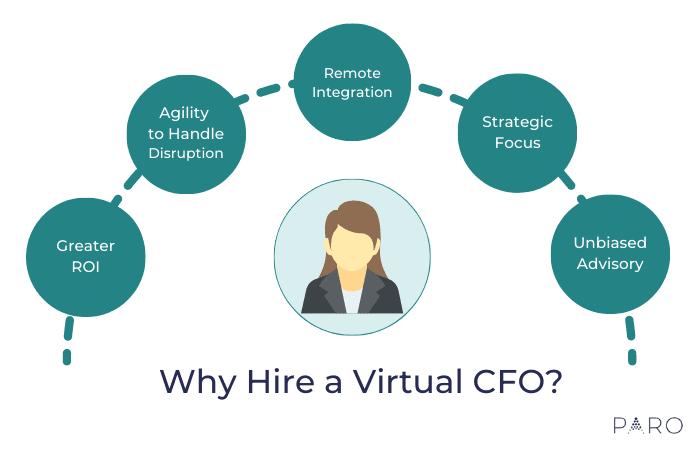The debate between onsite vs. remote and full-time vs. fractional employment continues to stay at the forefront of business discourse. In our fast-paced, data-driven world, businesses need individuals who can meet unprecedented opportunities and challenges, and in many cases, that means rethinking hiring and traditional employment. This is no different in the c-suite, where many businesses lack a full-time CFO or struggle to find the right person with the right value. Is a traditional CFO still the most effective choice? See why the virtual CFO offers five good reasons to change the way you think about the c-suite.
What Is a Virtual CFO?
A virtual CFO works remotely on a contractual basis, optimizing or overseeing accounting and financial functions including financial and strategic planning.
While having an offsite expert can appear to be a drawback for companies that want someone close to the business, remote experts offer an outside perspective and the ability to focus solely on the project at hand. In the changing role of the CFO, where strategy, innovation and specialized skills are needed to usher companies through digital transformations and economic instability, a virtual CFO doesn’t require you to find talent in your own backyard. In fact, 40% of finance functions are already taking advantage of remote, outsourced support to hire the right skills more efficiently.
Modernize Your C-Suite: 5 Benefits of Hiring a Virtual CFO
While asking a fractional CFO to be onsite is useful for certain projects or industries, virtual CFO services provide additional benefits to the already cost-effective upsides of freelance talent. This is especially true as businesses seek a more modern finance function that can keep up with change.
Remote CFOs offer five major advantages:

1. Optimized ROI
The flexibility offered by fractional CFOs is a key benefit of the work arrangement. And the remote nature of the work means no funds are required for office space or benefit packages, which leads to significant savings.
But more so, virtual CFO services allow you to tap into a potential team of talent without increasing headcount and overhead costs. Many virtual CFOs manage with their own remote firm, which means that complex projects (or those with components outside of the CFO’s scope) can be delegated or automated across a network of virtual experts, from accountants to analysts. With a network of experts across the country, the CFO can use that network to augment their knowledge, foster innovation and increase their own bandwidth to apply greater focus. And that means greater return for your investment.
2. Agility in a Disruptive Environment
The ability to quickly scale is important in the face of disruption and rapid digital change. Recruiting for a full-time, onsite CFO takes a significant amount of time and resources. Attracting candidates, selecting and onboarding are processes that can easily span months, especially if busy c-suite executives must interrupt their schedules in the process.
Virtual CFO services find the top experts for you, and those experts are experienced in integrating quickly into new business teams. They know the right questions to ask to ensure they’re a good fit, and they’ll get clarity on objectives and scope to ensure they add value efficiently. When a project such as fundraising or digital transformation is complete, you can also easily scale back down to meet your needs.
3. Improved Remote Integration & Data-Based Collaboration
Remote experts thrive in digital spaces, and remote CFOs have strong experience in digital communication and project management tools to collaborate across locations and teams. Improving information quality, streamlining operations and minimizing inefficiencies are second nature for most CFOs, but remote CFOs often update their skills in the latest digital tools and technology to remain competitive. If you’re looking for someone to effectively integrate into a remote setting or improve your own remote collaboration, then this is a real advantage.
Their digital-forward approach also recognizes that data is king. Sharing and using accurate data is vital, and inaccurate or incomplete data can be useless—or worse—damaging to their ability to meet your objectives. This is critical with the rise of AI and the integration of ERP systems with document retrieval, payment and other downstream systems.
4. A Focus on Strategy
All roads along the future of finance lead to strategy. And with businesses increasingly using automation for accounting tasks, all finance roles from accountants to CFOs must shift to deliver more strategic and analytical insights. Often, that means hiring for skills that are hard to find or that exist outside of your geography.
Because they’re not hired for everyday tasks, and nor should they be, virtual CFOs focus on adding value. The key way they do this is by being masters at financial analysis and planning. They immediately look into your KPIs and financial data to determine where you’re focused and to advise on working capital management, tax planning, investment options and more. They use industry benchmarks, economic trends and niche market analysis to assess where you should be in the marketplace.
With today’s focus on data and analytics, part-time and virtual experts let you find top analytical skills from anywhere and focus those skills squarely on strategy.
5. Strategic Independence
Strategic objectives contain inherent bias. Expanding product lines, obtaining greater regional presence through an acquisition and seeking angel investments are viable goals, but are they the actions your company should take?
Traditional CFOs often have skin in the-game and can benefit financially from achieving specific profit margins or other performance goals. With virtual CFOs, independence is implicit. Recommendations resulting from analysis are unbiased and offer a fresh, unfettered perspective of what the optimal actions are for the organization. Factors beyond numbers must also be considered, but when they are tempered with fact-based details, decision making is more sound.
How to Find the Right Virtual CFO for Your Business
Finding the right virtual CFO for your business begins with determining what you hope to accomplish. Having clear goals, such as orchestrating the transition to a new ERP system or preparing for an IPO, is ideal, although there are usually several objectives. If your need for a CFO is more nebulous, the right virtual CFO candidate will be the one who can draw the details out of you.
Credentials, experience and availability are each important, but do not lose sight of the most critical soft skill: communication. A virtual CFO should be able to articulate how their skill set and experience lend themselves to your company’s needs and what, if any, challenges they are likely to encounter. When conversation at this level easily flows, there is a good chance that that skill will carry over into their ongoing relationship with your broader team.
Finally, when it comes to virtual CFO costs, a smaller budget may only attract a first-time, traditional CFO. However, that same budget could secure three days per week of a virtual expert skilled in multi-entity reporting or investor fundraising experience in your industry. So, you’ll get pointed guidance that increases the value of the partnership.
A Network at Your Fingertips
If a new opportunity, rapid growth or a changing business environment are leading you to consider virtual CFO services, reach out today to talk with one of our solutions consultants who can match you with vetted, virtual experts to accelerate your organization’s success.






